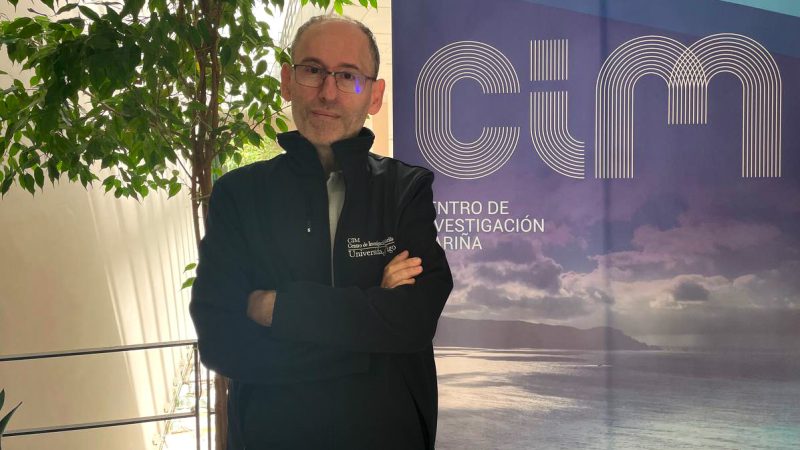Marinnonet is developed within the framework of the Interreg Atlantic Area program
Blue biotechnology promotes the sustainable use of marine and coastal resources to develop innovative solutions in fields such as sustainable aquaculture, conservation and restoration of marine ecosystems, marine food production, and the search for bioactive compounds with applications in the pharmaceutical, cosmetic, and food industries. These activities play a significant role in local economic growth, requiring an international R&D cooperation environment that enhances the sector’s competitiveness and sustainability in the Atlantic region. This is precisely the objective of the Marinnonet project, an initiative led by the Marine Research Center of the University of Vigo (CIM) and recently selected within the Interreg Atlantic Area program with a funding of 2.3 million euros.
The aim of the project is to improve innovation and transfer capacities in the field of blue biotechnology in the countries of the Atlantic area and brings together actors of the quadruple helix (academia, administration, business and society) from Spain, France, Portugal and Ireland dedicated to R&D&I in marine biotechnology to create a transnational cooperation network to boost the sector’s innovation capacity. In this way, the joint exploitation of their competences and capacities will be achieved for the benefit of blue innovation to ensure its competitiveness in the European and global blue economy and the sustainable use of marine resources, contributing to climate change adaptation.
Marinnonet will be launched in January 2024 and will run for three years, with the aim of creating a transnational R&D&I cooperation network to boost the innovation capacity of the blue biotechnology sector in three fields of action: innovations for efficient, sustainable and resilient aquaculture; omics observation technologies to preserve marine biodiversity and restore the health of the ocean; and marine products for industrial applications.
International cooperation
The project’s principal investigator and professor at the CIM, José Luis Soengas, stresses that “transnational cooperation is essential to achieve the project’s objectives and results, as the regions of the Atlantic area face common challenges and #opportunities in the blue biotechnology sector”. Thus, through Marinnonet “actions will be coordinated to share resources and knowledge and address local needs from a systemic perspective. In addition, the project will benefit blue biotechnology companies, stimulating innovation and the development of new products,” he adds.
Soengas stresses that this initiative “is of great importance for the CIM, as it provides the opportunity to strengthen and improve innovation and transfer capabilities in the field of marine biotechnology” and ensures that “by being part of this joint initiative, the centre will be able to collaborate with other relevant actors of the quadruple helix in different regions of the Atlantic area, which will expand its network of contacts and enhance the transfer of knowledge and technology”.
In addition, the principal investigator also stresses that this project will help foster “the creation of new products, services and companies in the blue biotechnology sector. This can generate employment and promote economic development in the coastal and marine regions of the countries involved.
For his part, the director of the CIM, Daniel Rey, also considers that “the synergy between research teams from different disciplines is one of the centre’s great strengths. This is fundamental to face the great challenges of our society with a comprehensive and innovative approach”. Through the leadership of these collaborative and interdisciplinary projects, he adds, “the CIM promotes the development of the blue economy, offering innovative solutions for industry and concrete applications in areas such as sustainable aquaculture, the conservation of marine biodiversity and the production of new marine products”.
Quadruple helix partners
Together with the CIM, academic and research entities such as the University of Las Palmas de Gran Canaria, the University of the Basque Country, the Spanish Institute of Oceanography of the CSIC, the University of Galway (Ireland), the University of Minho (Portugal), Sorbonne Université (France), Munster Technological University (Ireland) and the Centro Interdisciplinar de InvestigaÇao Marinha e Ambiental (CIIMAR) of Portugal are part of the Marinnonet project. In addition, representatives of the public administration such as the Galician Innovation Agency (GAIN), the Hazi Fundazioa, the Society for Economic Promotion of Gran Canaria and the Irish Bioeconomy Foundation (Ireland) are collaborating in the project. The coastal action group GALP Ría de Vigo and the fishing local action group of the Basque country Itsas Garpen Elkarta Flag are representatives of society. On the business side, the National Association of Canned Fish and Seafood Manufacturers (Anfaco), the National Association for Marine Bioresources and Blue Biotechnology (Portugal), the Pôle Mer Bretagne Atlantique cluster (France) and Blue Bioeconomy CoLAB (Portugal) are participating.
Source: DUVI

